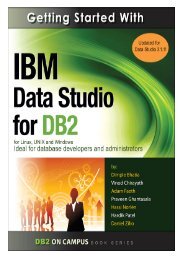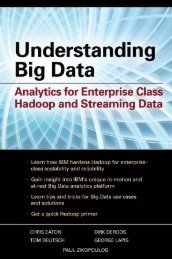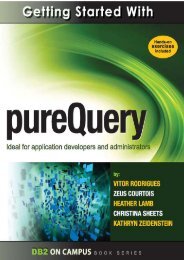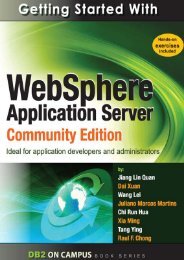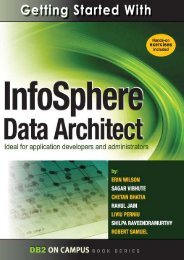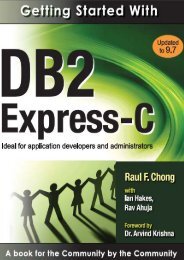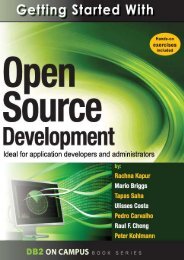Getting Started with Open Source Development
Create successful ePaper yourself
Turn your PDF publications into a flip-book with our unique Google optimized e-Paper software.
Chapter 2 – <strong>Open</strong> source business models 39<br />
To an extent, Express editions have not seen significant adoption due to the customer's<br />
perception that these editions are nothing more than crippled software <strong>with</strong> upgrade paths<br />
to the fee-based versions. And though this may be true in some cases such as Oracle XE<br />
and Microsoft SQL Server® Express which place a 2GB hard limit on the amount of data<br />
that can be stored; other companies like IBM <strong>with</strong> its DB2 Express-C database product, do<br />
provide more flexibility.<br />
Did you know?<br />
IBM DB2 Express-C database server does not provide any restriction on the amount of<br />
data you can store. It can run on Linux, Windows, and the Mac OS, and can be installed on<br />
hardware of any size. Applications developed for DB2 Express-C will work <strong>with</strong> no<br />
modification on other editions of DB2, should you need to upgrade, because DB2 Express-<br />
C is built using the same code base as the other DB2 editions.<br />
For more information visit ibm.com/db2/express<br />
Did you know?<br />
When Oracle bought Sun Microsystems in 2009, MySQL became an Oracle product since<br />
MySQL had been bought by Sun a few years earlier. At the time of writing, Oracle has not<br />
made it clear what are its plans for MySQL, but there are interesting comments here:<br />
http://freedb2.com/2009/09/22/ellison-oracle-does-not-compete-<strong>with</strong>-mysql-mysqldisagrees/<br />
In conclusion, using an Express version does have its merits when the product offers you<br />
low cost optional support, flexibility of use, and an easy upgrade path to more sophisticated<br />
editions in the future as your needs grow.<br />
2.8 Summary<br />
This chapter started <strong>with</strong> an explanation about the open source software ecosystem, and<br />
how it generates money to sustain itself. It then explained the different business models<br />
that exist in the world of open source, and how choosing a model can impact you as a<br />
contributor to open source software communities. Finally, we looked at "Express" versions<br />
of proprietary software as an alternative for companies to start <strong>with</strong> no licensing cost, the<br />
option for low cost customer support, and the possibility to easily upgrade to a version <strong>with</strong><br />
more features.<br />
2.9 Exercises<br />
Review the following article which provides a brilliant analogy about a POSS company and<br />
bee-keeping.<br />
http://wiki.pentaho.com/display/BEEKEEPER/The+Beekeeper




